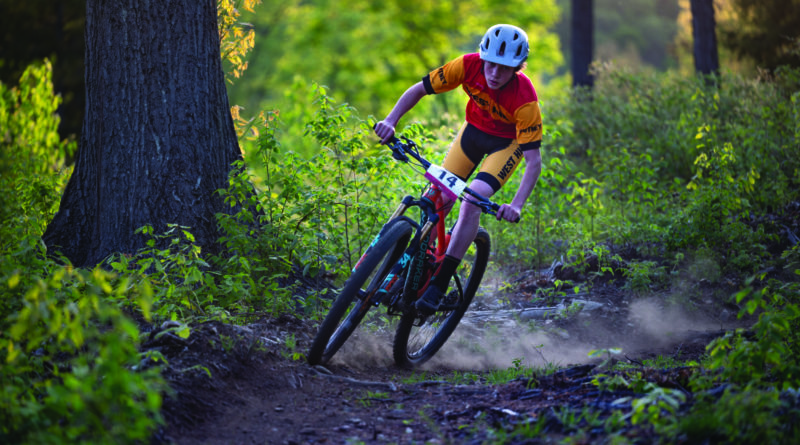50 Years of the West Hill Shop
On a sunny afternoon in May, Zach Caldwell squats outside the West Hill Shop in Putney reattaching a kickstand to a customer’s e-bike. The customer came in for a longer stem. Amy Caldwell, Zach’s wife and business partner, found one and now Zach is giving the bike a once-over before sending it off.
“When I got into the ski business, I figured I better know how to do everything. Now that I’m in the bike business, it’s the same thing,” says Zach, glancing up.
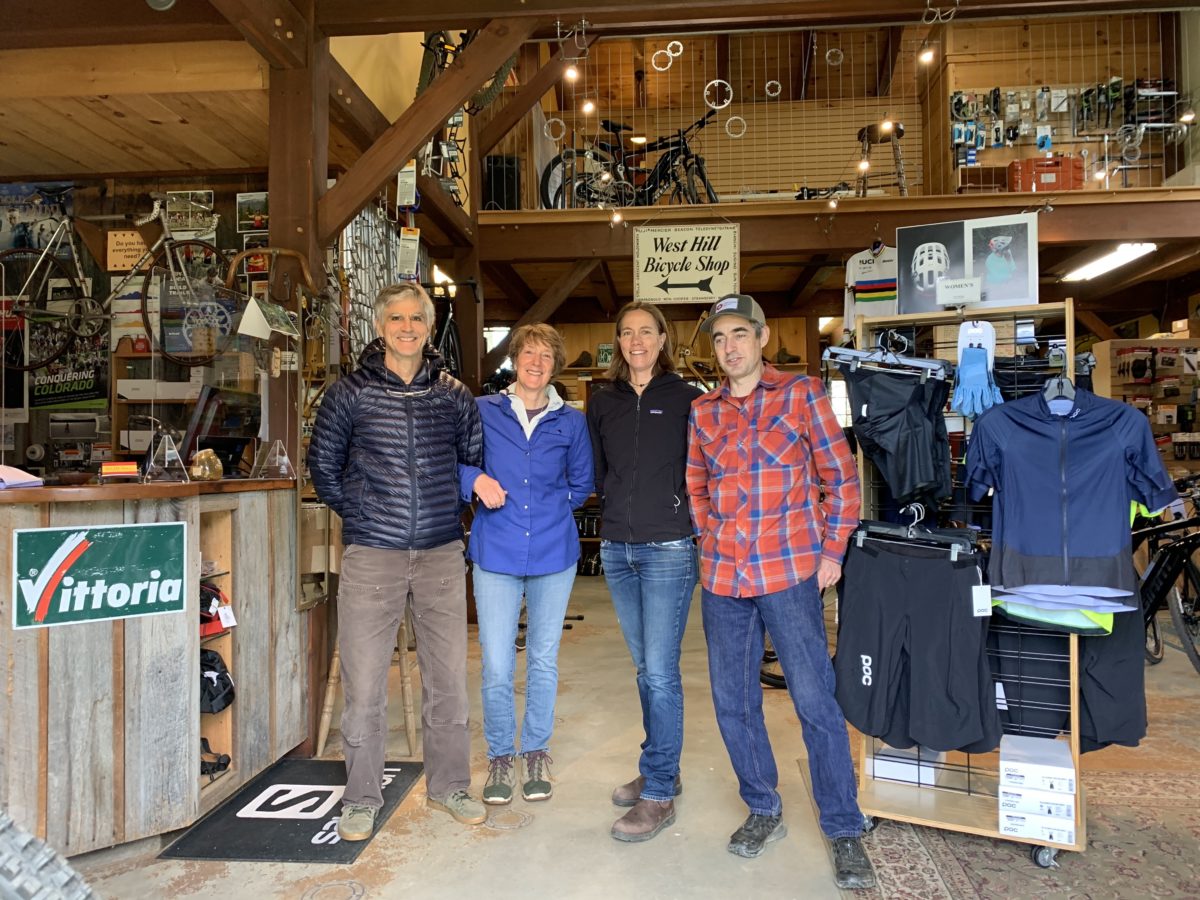
Zach Caldwell is a scion of America’s first family of Nordic skiing. His uncle John Caldwell was a Nordic combined athlete who competed in the 1952 Olympics. He literally wrote the book on cross-country skiing and coached Olympic gold medalist Bill Koch, Bob Gray and a host of other top racers. John’s kids—Tim, Sverre, Jennifer and Peter—all raced at the collegiate level and beyond; with Tim going to the Olympics and Sverre becoming coach to the Stratton Mountain School T2 team. It was Sverre who then trained World Cup racers such as his own daughter Sophie and nephew Patrick, Jessie Diggins, Simi Hamilton, Ida Sargent and more.
Zach’s wife and business partner Amy (whom he calls “the athlete in the family”) is a former cross-country ski coach at Stratton Mountain School and head coach at Canada’s Olympic training center, Callaghan, in Whistler. She is also a two-time amateur World Champion triathlete.
The couple have been called the “ski whisperers,” by Outside Magazine. More than a ski shop, their Caldwell Sport is a consultancy to top-level cross-country ski racers; offering coaching, as well as selling and servicing equipment.
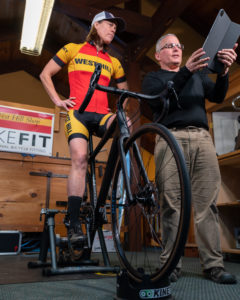
The couple are so in tune to the technology that goes into race skis, the technique of World Cup-level ski racers and the nuanced impacts of waxes, camber and flex that racers from around the world have made pilgrimages to Caldwell Sport to buy skis or get them serviced. Until recently, that “shop,” has been basically a garage attached to the family’s home in Putney.
Then, in 2020, the Caldwells, both Middlebury College varsity ski racers, heard that after 16 years of ownership, Jim and Diny Sweitzer were selling the West Hill Shop, the iconic bike and ski shop down the road.
“It complemented what we do, it would allow us to grow and it just seemed to make sense from a business standpoint,” Zach says.
The Caldwells bought West Hill in the fall of 2020 and in the months since, they have started to apply the scientific approach and insights into performance from their years in the ski world to cycling.
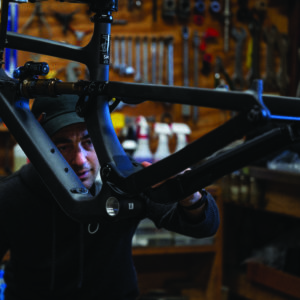
“You know suspension telemetry is something that is done in high level gravity racing and now some in cross-country too,” Zach says.
It’s a topic Zach plunges into with gusto. “It’s interesting for me because suspension is dynamic and cross-country skis are too. When you start trying to engineer motion into something like a ski camber, or bike suspension, you have the opportunity to create really personalized solutions. Bike suspension is super interesting, very involved and advanced in ways that are way, way beyond my expertise,” he says. He pauses and then adds, “But not in ways that I am afraid of. In fact, the ski stuff has given me insight into bike suspension and the bike suspension has given me insight into the dynamic properties of skate skis.” You can almost hear the wheels whirring in his head.
The West Hill Legacy
The Caldwells represent Phase 3 for a shop that has spawned a brain trust of talent in cross country skiing and cycling, whose owners have gone on to race in the Olympics and to edit the country’s top cycling magazines, whose events have drawn some of the nation’s top racers, and which has been a leader in the New England cycling community.
In 1970, Neil Quinn and Bob Anderson were co-workers at the Guilford-based book design firm, R.L. Dothard Assoc., which had produced John Caldwell’s book on cross country skiing. Quinn, the story goes, became so inspired by Caldwell’s The Cross-Country Ski Book as he was working on it that he picked up skiing. It was a passion Anderson then fueled by getting Quinn into cycling to stay in shape in the off season. “Bob Anderson, who was from Boston, was a bike racer and involved in the Northeast Bicycle Club, and he and Becky really started it all,” remembers Robert George, at the time another Brattleboro cyclist and early West Hill Shop partner. George and his wife Barbara, the Quinns and Andersons began doing weekly rides and time trials, along cross-country ski racers Bob and Sue Gray, Martha Rockwell and others.
A West Hill group ride in the early 1970s might have also included Bill Farrell, who went on to develop the FitKit and the floating mechanism for cleats or Richard Sachs, who went on to build high end bike frames, or Brattleboro local Ed Pavelka, who later became the editor of Bicycling Magazine.
“The one problem back then? It wasn’t easy to find the equipment they needed for their bikes so they decided to start a bike shop and import their own,” says Bevan Quinn, Neil’s son. Neil Quinn started Snail Cycles. Meanwhile, Olympic cross country skier Bob Gray (father to Vermont’s Lieutenant Governor Molly Gray) had a ski shop in an old schoolhouse on West Hill. In 1971 the four families—the Quinns, Andersons, Georges and Grays—joined forces in what became the West Hill Shop, each kicking in $500.
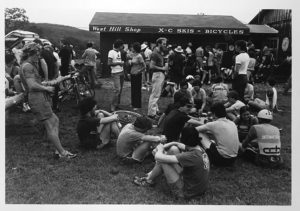
In 1973, West Hill Shop moved into the present location, a shed in a field just off Exit 4 on I91. The place had no insulation, its only source of heat was a wood stove and there was no bathroom or running water – and it stayed that way for three decades.
The shop was a co-op of sorts with everyone pitching in to sell gear, fix bikes and to host time trials and races. Becky Anderson sewed the shop’s first jersey with the iconic orange and red stripes. It still hangs in the shop today. Barbara George began writing up the races for local publications and Bob George took the photos. Neil Quinn left his job as a book designer and ran the shop until he sold it in 2004. He died of cancer in 2018.
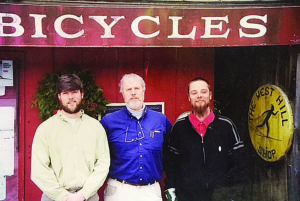
“They started the shop at a time when bike riding was something kids mainly did and a ‘bike’ usually meant a Schwinn,” says Bevan Quinn, Neil’s son, who started working at West Hill Shop at age 15 and ended up working there for 27 years.
The shop began buying some of the best European bikes and parts of the era— Gitane, Campagnolo, Cinelli. “Everyone who was into cycling in New England knew about the shop,” remembers Jim Langley, who worked there from 1978 to 1982.
“I jumped at the chance to work there. They had all the latest and best bikes and tools and Neil was just the greatest, most easy going guy. As a co-op, the shop had an open door policy. Anyone could come in and borrow tools and work on their bike there,” he remembers.
The shop also carried the highest end bikes. “It was fun to work on those bikes and meet the people who owned them,” Langley recalls. The artist Jim Dine was one of his customers and author John Irving and musician Joe Walsh (of The Eagles) frequently came by for help with their bikes. Olympic ski racer Bill Koch was a regular.
The shop also became known for its events. A road race, the Tour of the Valleys grew and grew. “It attracted up to 700 racers, some of the best in the East, racing all these back roads in southern Vermont,” says Bob George.
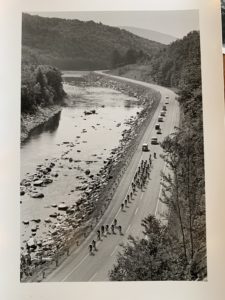
“One year I remember being in the lead car with Neil in front of a pack of 80 cyclists going 40 mph. We came to a town where a cop was standing, arms crossed, in the middle of the road. Everyone just blew right past him,” Langley recalls. Ahead, though, was a roadblock with four cop cars, lights flashing and some angry, red-faced officers. “Neil gets out and walks up to them and I was sure someone was going to be arrested,” Langley says with a chuckle. “But within a few minutes they were all laughing and smiling. That was the effect Neil had on people.”
As a race, the Tour de Valleys outgrew the area, but later came back as a self-guided, scenic 56-mile ride. A cyclocross event the shop started in 1990 has continued, celebrating its 29th year in 2019 and attracting the top talent in the Northeast as the Vermont state championships. That race and the West Hill Gravel Grinder continued until Covid caused a 2020 hiatus. But both are coming back for fall of 2021.
In the first decade of the shop, one by one, the original partners sold their shares and Neil Quinn became the sole owner. Bob and Barbara George had started Northeast Bicycle News which they expanded to cover the nation and it became Velo News, one of the first nationwide bicycling publications and still the authority on bike racing. The Georges still live in Brattleboro and in 1994 Barbara was inducted into the U.S. Bicycling Hall of Fame. Bob Gray competed in the 1968 and 1972 Olympics and later moved to a farm in Newbury, Vt. The Andersons moved on but remained in the area.
In 2004, it became time for Neil Quinn to sell. “The shop was really more of a clubhouse than a viable business,” says Bevan Quinn.
Jim and Diny Sweitzer had been customers of the shop, making the drive from Massachusetts for many years. Jim had a chance to work in the area and they bought the shop in 2004.
Langley took a job in a shop in California and began writing books about bikes and fixing bikes, including Bicycling Magazine’s The Complete Guide to Bicycle Maintenance and his most recent, the Your Home Bicycle Workshop. He also served as Bicycling Magazine’s technical editor, working at the magazine with another former Brattleboro local, editor Ed Pavelka. and later, another West Hill employee, Don Cuerdon (who earned the nickname Captain Dondo while at West Hill).
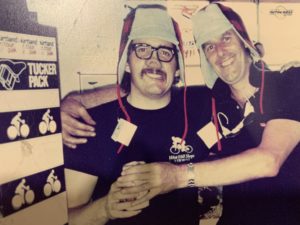
In 2021, Langley marked his 10,000th consecutive day of bike riding —a 27 year streak.
“I had no idea at the time that it [working at West Hill] would change my life and lead to a real career in the industry I love,” Langley told Bicycle Retailer on the occasion of Neil Quinn’s passing in 2018.
The Schwinn Jaguar that Langley converted into an ‘off-road’ bike in 1979 still hangs from the ceiling. “I’d ride it all over the cross country ski trails. I think it was the first mountain bike on the East Coast, and no one has told me otherwise yet” he says.
50 Years And Growing
“I was born in 1971, the same year this shop was founded,” says Zach Caldwell as he finishes work on his customer’s e-bike. “I lived four miles down the road and remember coming here as a little kid,” he says.
Buying the shop in the midst of the coronavirus turned out to be a blessing in disguise. “It gave us a breather on events and a chance to do a slow launch, to try different brands and experiment since pretty much everything we could get in here we sold.”
This past year as supply chains ran dry, the shop sometimes had to build up bikes with whatever parts they could get which forced experimentation. But one thing hasn’t changed, alongside the many e-bikes and the hybrids that are the bread and butter of any bike shop are some of the most tricked-out bikes on the market from Specialized, Transition, Evil, Mondraker, and some lesser-known brands.
There is an alloy Banshee Phantom Zach has built up with Italian EXT suspension. Upstairs, a Specialized S-Works Racing Shiv, time trial bike that retails for around $13,500 is waiting to be fitted to its new owner, four-time Olympic cross-country ski racer Kris Freeman, now a triathlete. The bike fitting is a project for Todd Miller, a physical therapist, college professor and photographer, who oversees the shop’s bike fit program.
On the wall hangs a Giant TCR Advanced SL 1 race bike with a composite frame that comes equipped with a power meter. “If you are an athlete and are into metrics this actually measures the wattage you put out,” notes head mechanic David Townsend. Earlier in the season, Townsend could be seen wheeling around the shop’s Cannondale Topstone Carbon Lefty 3 gravel bike.
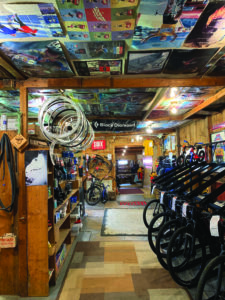
Few bikes stick around the shop long, these days, but other than the new bikes and gear, much of the shop looks and operates like it has for decades. Pip Bannister, a gray-haired retired architect who has won the 60+ age group at the Cyclocross Nationals multiple times, is working on a bike. “I’m retired and really just here part-time,” he insists.
The day I visit, Townsend, head mechanic, is building a wheel. Jordan Hughes (who in addition to his shop experience has a master’s in acupuncture and Chinese herbs) is taking a break to stalk flies with a pellet gun. And Jim and Diny Sweitzer, the former owners, are there to help out.
The only two employees missing that day are Kirsten Jeppesen, a wellness coach who rides and skis pretty much everything, and Todd Eastman, a mountain guide and the former race services director at the cross-country ski company Madshus USA. It’s a team that the Caldwells have inherited and have kept intact. And the Sweitzers come in to help out.
“I couldn’t think of better owners for this place,” says Diny Sweitzer as we walk through the shop she helped build out. “We had a good run but now we’re tired and it needed new young blood.” The same could have been said in 2004 when the Sweitzers, then customers who would come up from Massachusetts, bought West Hill from Neil Quinn.
At the time, the shop still had no heat or running water, or even an outhouse. “I remember sending a woman who wanted to try on bike shorts over to the neighbors’ house. She had to climb over a snowbank to get there. I think she was horrified but she bought the shorts.”
The original part of the shop, not much more than a shed, still has posters covering every square inch of ceilings and walls.
And a wood stove, the shop’s only source of heat for more than 30 years, still warms the old part of the shop in the cooler months though the Sweitzers added on, put in solar panels (enough to make the shop 14 percent net-negative in terms of its electricity usage), heat and a bathroom – a space Diny is particularly proud of. They tore down a leaky old warehouse and built the airy two-story main section of the shop.
“What the Sweitzers did with this shop during the 16 years when the bike industry was going through an upheaval and everything was going online is mind blowing,” Zach Caldwell says.
The Sweitzers grew the shop all while working hard to keep it part of the community and make cycling accessible to more people. Diny helped launch women’s rides from the shop. Pip Bannister started a mountain bike club for local kids and the Sweitzers decided that any kid should be able to participate so they did a bulk buy of 12 bikes of different sizes and created a lending library of bikes. A photo of Putney’s Alicia Dana, a World Champion handcyclist and Paralympic medalist hangs on the wall, one of the athletes the shop has sponsored.
The Caldwells are continuing that philosophy, “We want this to be a place where everyone comes to ride,” says Amy Caldwell. Son Gunnar, a cross-country racer at Stratton Mountain School, now pushes his parents on their family bike rides. “We want local kids here on the pump track, too,” says Amy.
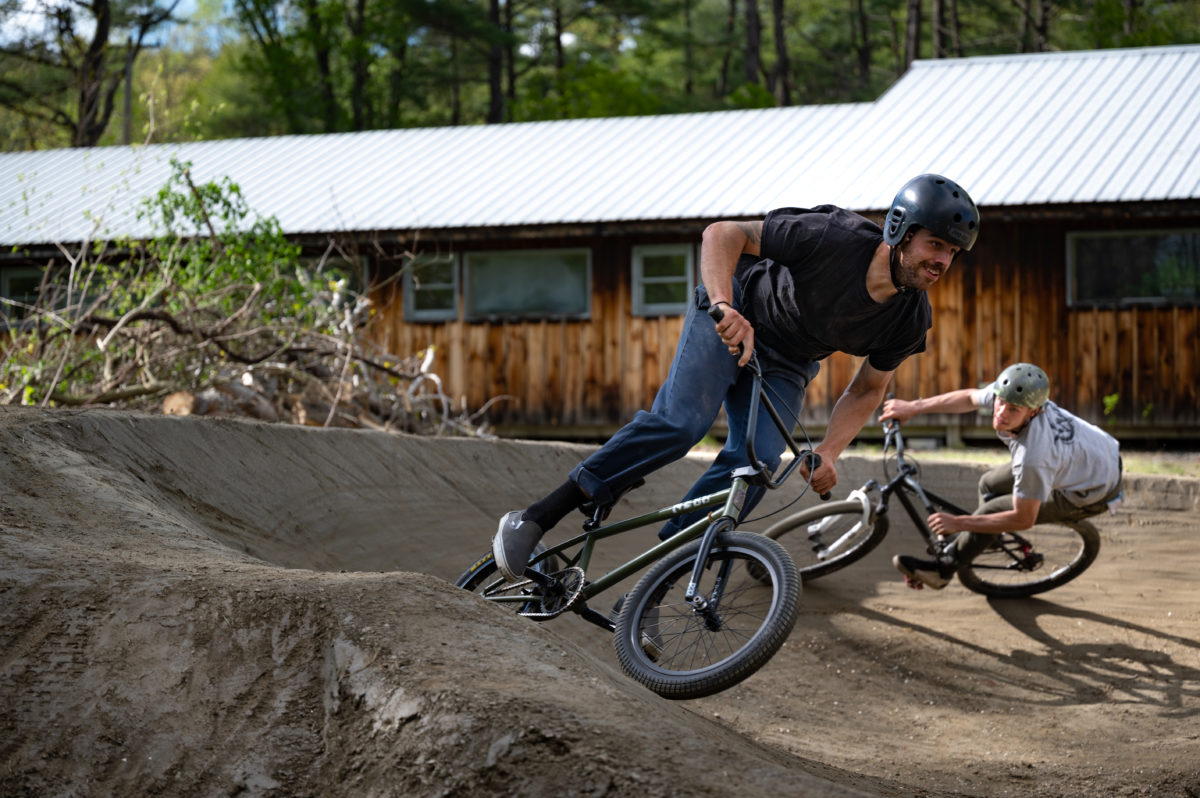
Next to the brand new pump track that went in behind the shop this past spring, Zach plans to put in a container that can serve as storage for the shop. He’s also designing a way to launch into the track from the container’s roof.
“We also want to have a fleet of e-bikes that folks can take out with self-guided tours pre-programmed into the GPS,” Zach says. “Community building is part of the role of every bike shop. In short, we’d love for the West Hill Shop to maintain our small-town culture but also be a cycling destination, someplace you drive to, park at and ride from.”
That, in fact, is what it has always been.

